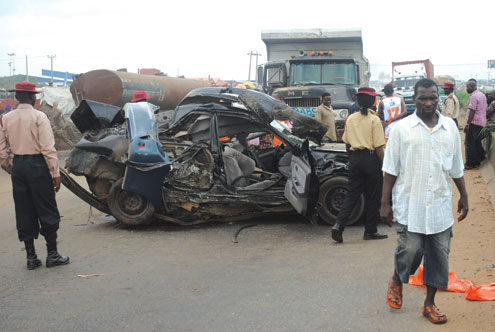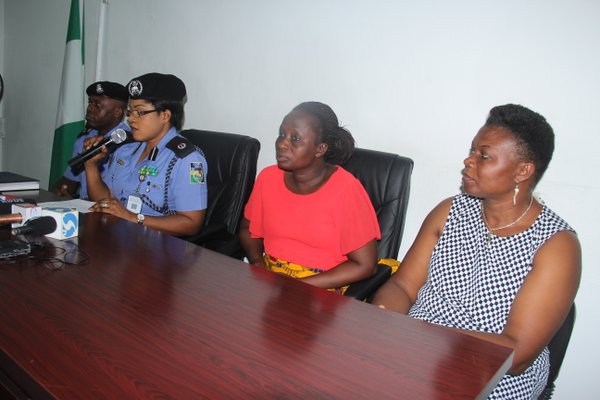The House of Representatives is spoiling for a fight with the Federal Road Safety Commission and I’m trying hard to believe that, whatever former President Olusegun Obasanjo may have said about legislators, the fight this time is not about the bread basket. Last Thursday, member after honourable member led by Philip Shaibu from Edo State (APC, Etsako Federal Constituency), took turns to hammer the FRSC over plans to start enforcing its regulation on speed limiters from April 1.
They said the technology was obsolete and expensive and that the Commission had fallen far too short of its last promise on number plates to be trusted on the speed limiter. Anyone who has been around here for a while might agree that the legislators have a legitimate concern. We have seen public institutions let us down so badly too often we have become quite cynical.
For example, according to a story by Premium Times in May, it took over N120billion and ten years for us to finally start getting the national identity card while hundreds of millions of Nigerians are still shut out of the system. The ZTE CCTV camera installed in Abuja for over $470million was fully paid for but never worked for a day. Nigeria has invested billions of dollars in the power sector but electricity consumed per capita is roughly 140kwh and way below the 155kwh in Kenya.
It’s a long list of extraordinary wastes and very difficult not to be cynical. In the case of the speed limiters, however, the House will do well not to allow cynicism get in the way of safety. Unlike Shaibu and other honorable members whose innumerable allowances give them various travel options, 90 per cent of Nigerians have only one option: travel by road.
Advertisement
According to figures by the FRSC, 10,050 people die yearly in road accidents. This works out to 27 deaths on the road daily and excludes hundreds of victims who suffer various degrees of injuries and permanent disabilities from such accidents. In aviation terms, it is like having three plane crashes every day. There are several causes, of course, but from the figures, over speeding accounts for 50 per cent.
Bad roads, overloading, the weather, poor vehicle maintenance and bad driving habits are also potential causes of road accidents. But statistics show that all of them combined account for only half of the carnage on our roads.
Again, if in aviation terms, 835 people were killed monthly from four commercial plane crashes, I’m sure there would be a national emergency and the House will invent new safety rules without splitting hairs. The regulation on compulsory use of speed limiters has been in existence (in the FRSC Establishment Act and National Road Traffic Regulation) since 2004 but perhaps because not many rich and powerful people use the roads, politicians have never cared much about enforcement.
Advertisement
Of course, if it’s correct that the technology for the speed limiter is obsolete, then the House – and the public – may genuinely have something to worry about. But that’s not even the case. In their haste to dispose of the baby with the bath water, members of the House conveniently – or maliciously – ignored the fact that the business of setting standards resides with the Standards Organisation of Nigeria (SON).
The speed limiter is not an exception. I had someone check with SON on Thursday and the organisation, along with the Nigerian Society of Engineers and the National Automotive Council, all rejected suggestions that the speed limiter was obsolete. It would be a sad day when SON, transport owners, road transport workers, the automotive design and development council, the police and the society of engineers, among others, will after four years of meetings and campaigns jointly conspire to impose sub-standard equipment on the country that will put thousands of lives at risk. If that is the case, Shaibu and co should show proof, rather than launching an emotional tirade that has obviously provoked the House to issue a pointless ban on enforcement.
Nigerians ought to take their lawmakers seriously and I think we try to do so at a cost far and above anything we could reasonably invest to make our roads safer. For any of them to seize the floor and make claims about a serious matter of public safety without proof is reckless and irresponsible.
Members of the House can advance special interests if they want to, but we should at least know it for what it is. What Shaibu said sounded so strikingly similar to a statement by a faceless group of transporters in August pushing a so-called “world acclaimed Spider Technology speed limiter.” I could not help wondering if it was a coincidence.
Advertisement
The group had said, “Speed limiter in all developed and African countries had been banned. Again, speed limiter device had been discovered to expose motorists to danger such as armed robbery, car snatchers, hired killers and kidnappers.” These were almost the same words Shaibu used to describe his objection last Thursday, words spoken to promote fear rather than inspire safety; words spoken in disregard of the facts.
It’s illogical to claim that speed limiters give kidnappers, car snatchers and armed robbers an advantage over road users. What, in fact, gives them advantage is unregulated speeding, which makes it even more difficult to instinctively judge the motives of potential criminals.
There are 33 countries in the world where speed limiters are used and Ghana and Kenya are close and current examples. In Europe, which is still planning continent-wide use of the device, Germany remains an enviable example of how unregulated autobahn produces Formula 1 champions, but sets a bad example in making the country one of Europe’s worst in road accidents. If that means anything, it shows that it takes more than good roads to keep lives safe.
As the April 1 deadline approaches, the FRSC should fully expect more widespread resistance and even betrayal from within, including amongst its own staff and partners who had signed up to the enforcement.
Advertisement
That’s nothing new. The seatbelt campaign did not involve purchasing any extra device, yet it was not an easy campaign. Even in the face of evidence that 60 per cent of fatalities are preventable by the use of seat belts, the FRSC had to literally get their men to strap drivers to their seats one-by-one, car-by-car, before the campaign began to make headway.
This time, with money involved and big men whose favourite toys might potentially be put on a leash, it’s going to be even more difficult and complicated. But after four years, two postponements and scores of lives wasting on the roads daily, one more postponement cannot be justified. There are times when people have to be saved from themselves. No matter what Shaibu and co think, such a moment is here again.
Advertisement
Ishiekwene is the managing director/editor-in-chief of The Interview and member of the board of the Paris-based Global Editors Network
Advertisement
Views expressed by contributors are strictly personal and not of TheCable.
1 comments








I am delighted that someone spoke my mind. I find it mind boggling that issues of lives is being trivialised and politicised. Like you rightly said they are throwing the baby away with the bath water. Would we say because the previous honorable members took decisions that were not favorable it automatically means the current one would do same? Why do we always site examples out of context?
The ban in Kenya was not because they were obsolete but for some sharp practices. I am wont to believe that the SON which is charged with ensuring standard must have done due diligence and same goes for every other body involved in the process. With the current outburst by the honourable members that the limiters are obsolete then the SON stands indicted.